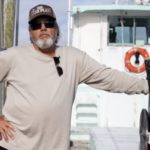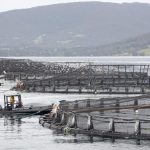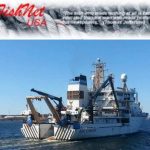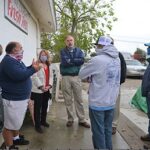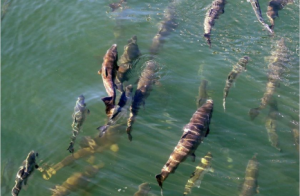Tag Archives: Narragansett Bay
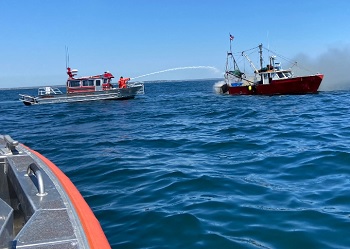
Fishing boat catches fire and sinks in Narragansett Bay
The Northeast Sector of the United States Coast Guard says that a 40-foot fishing boat sank in the Narragansett Bay Thursday afternoon following a fire on the boat. The Coast Guard said they received a report of a boat fire around 11 a.m. Thursday about 2.5 miles southeast of Point Judith. The three people on board were safely rescued and brought to shore by a crew from STA Point Judith. They were then transferred over to local EMS, the coast guard says. >click to read< 20:57
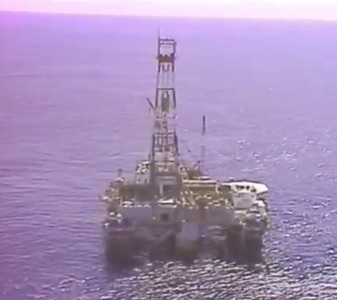
1979: NBC 10 reported on oil platforms drilling offshore New England
The Texas Towers radar platforms that were the subject of our special broadcast in the 1960s were gone by 1964. In the next two decades, they were replaced by a different kind of platform — one that drills for oil offshore. In 1979, one was in Narragansett Bay headed south to the Baltimore Canyon to drill. And in 1981, two platforms were drilling for oil in the Georges Bank, much to the consternation of commercial fishermen who worried their rich fishing grounds would be disrupted and polluted. >video, click to read<16:34
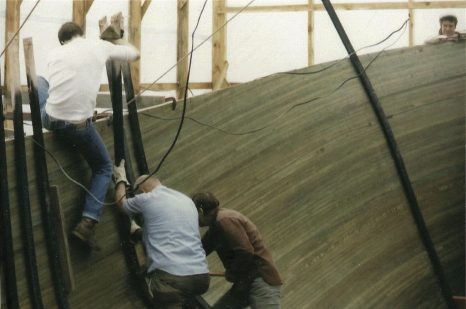
The View From Swamptown: Donald W. Wilcox Sr. was a true man of Narragansett Bay
Don Wilcox was born to spend his days out on the waters of Narragansett Bay. Its harbors and coves were as familiar to him as the streets and lanes are to a postman on his beat. If someone were to tell me that his blood flowed saltier than yours or mine, well, I’d have no trouble believing it. I expect he was never happier than when he was hauling in a full dredge loaded with mussels, seagulls squawking and swinging through the air above him, starfish and spider crabs scurrying around between his feet. That was his world. That was his life. Claimed by two different seaside villages, Wilcox – Apponaug’s most prominent boatbuilder, and Wickford’s king mussel man – was at ease and at home in both places, pleased as punch to be living both lives. >click to read<09:09
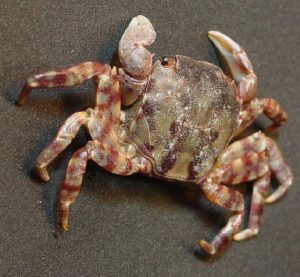
Narragansett Bay – Invasive Asian Crab Outcompeting Young Lobsters
Speculation about the cause of the decline of lobster populations in Narragansett Bay has focused on an increasing number of predatory fish eating young lobsters, warming waters stressing juveniles, and a disease on their shells that is exacerbated by increasing temperatures. A new study by a scientist at the University of North Carolina points to another contributing factor: Asian shore crabs.,,, Adult lobsters live in much deeper water than the shallow intertidal zone inhabited by Asian shore crabs, so the two species seldom interact. But some larval lobsters settle in the intertidal and subtidal zones, which they use as nursery habitat. Prior to the arrival of Asian shore crabs, it was an area that had fewer predators and an abundance of food. But now the young lobsters are finding themselves in competition with the crabs for food and shelter. >click to read<09:25
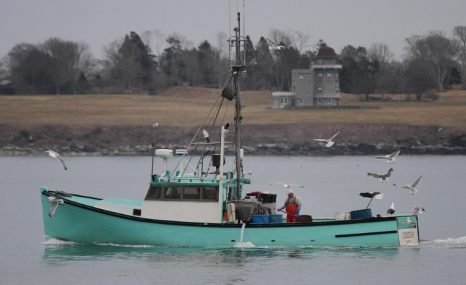
Fishermen: Narragansett Bay cleanup might be doing harm
Narragansett Bay is cleaner and clearer than it’s been in decades. But after huge strides in treating wastewater and controlling storm runoff, some are asking a question that would have been unthinkable just a few years ago about what is arguably Rhode Island’s most valuable natural resource: Is the Bay too clean? Fishermen are raising the issue after seeing steep declines in numbers of flounder, lobster and other species that were once so abundant that they formed the bedrock of their industry. It has gotten bad enough that lobsterman Al Eagles says that he and others now call the Bay “Chernobyl,” a reference to the site of the devastating Soviet-era nuclear disaster. click here to read the story 09:20
Waste Water Treatment Plants: Once home to thriving aquaculture, Great Bay is under great strain – You can see it in the lack of eelgrass beds that used to cover thousands of acres of tidal flats. These new treatment plants have filtered or poisoned most of the nutrients from the Piscataqua River and the many other rivers that serve their municipalities that dump their now super-treated effluent into the tidal water, now so sterile and lacking in nutrients and full of poison that plants and animals cannot survive. click here to read the story
Long List of Factors Stressing Out (poisoning) Narragansett Bay
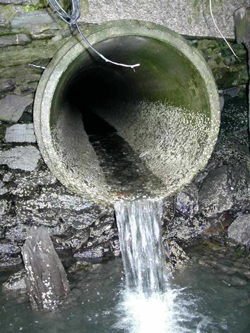 The Narragansett Bay Estuary Program has developed a draft report on the status of Narragansett Bay entitled “State of the Bay and its Watershed.” Numerous factors, beyond climate change, sea-level rise and legacy contaminants, stress Rhode Island’s most significant natural resource. Here is a look at some of the others detailed in the NBEP’s draft report.,, Population growth, Land-use changes, Impervious surfaces, Nutrient loading, Chemical contaminants of emerging concern (CECs). They include but aren’t limited to nonprescription and prescription pharmaceuticals, personal-care products, and industrial chemicals used in a wide range of consumer, commercial and industrial products. Some examples: antidepressants, antihypertensives, antibiotics, painkillers and synthetic hormones; antimicrobials such as Triclosan; UV blockers in sunscreens such as oxybenzone; DEET, a pesticide which is applied to human skin; fragrances such as synthetic musks; flame retardants such as polybrominated diphenyl ethers; additives to plastics; and synthetic materials such as bisphenol A, commonly referred to as BPA. click here to read the story 16:53
The Narragansett Bay Estuary Program has developed a draft report on the status of Narragansett Bay entitled “State of the Bay and its Watershed.” Numerous factors, beyond climate change, sea-level rise and legacy contaminants, stress Rhode Island’s most significant natural resource. Here is a look at some of the others detailed in the NBEP’s draft report.,, Population growth, Land-use changes, Impervious surfaces, Nutrient loading, Chemical contaminants of emerging concern (CECs). They include but aren’t limited to nonprescription and prescription pharmaceuticals, personal-care products, and industrial chemicals used in a wide range of consumer, commercial and industrial products. Some examples: antidepressants, antihypertensives, antibiotics, painkillers and synthetic hormones; antimicrobials such as Triclosan; UV blockers in sunscreens such as oxybenzone; DEET, a pesticide which is applied to human skin; fragrances such as synthetic musks; flame retardants such as polybrominated diphenyl ethers; additives to plastics; and synthetic materials such as bisphenol A, commonly referred to as BPA. click here to read the story 16:53
R.I. Clammer Dan Briggs concerned about wastewater plant chlorine killing steamers in Narragansett Bay
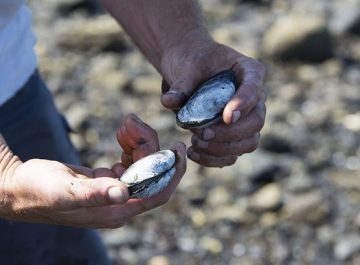 Dan Briggs is afraid he’s losing his job. That explains his angry posts to social media this summer. His venting, however, isn’t doing anything to solve the problem, but at least his boss doesn’t mind. For the past 20 years, the South Kingstown resident has run a one-man commercial operation that sells streamers — dug by hand, with help from a short rake — from tidal areas throughout Narragansett Bay. The soft-shell clams he’s digging up now — far fewer than he was a dozen years ago — often don’t look right, at least when it comes to the color of their shells. He stopped eating his own catch several years ago. “I know this is bad advertising for my business, but I want the bay cleaned up,” said Briggs, who comes from a long line of quahoggers and diggers. “I just want a cleaner bay, a better protected bay, so I can keep my job and sell high-quality shellfish. But we don’t care about cleaning up spots; we just cover our asses and close them to shellfishing.” “Chlorine is killing them,” Briggs said. “There must be other ways to treat our sewage than dump it in the bay. I’m not a scientist, but there must be a better way to collect and treat our sewage.” Read this important article here 15:08
Dan Briggs is afraid he’s losing his job. That explains his angry posts to social media this summer. His venting, however, isn’t doing anything to solve the problem, but at least his boss doesn’t mind. For the past 20 years, the South Kingstown resident has run a one-man commercial operation that sells streamers — dug by hand, with help from a short rake — from tidal areas throughout Narragansett Bay. The soft-shell clams he’s digging up now — far fewer than he was a dozen years ago — often don’t look right, at least when it comes to the color of their shells. He stopped eating his own catch several years ago. “I know this is bad advertising for my business, but I want the bay cleaned up,” said Briggs, who comes from a long line of quahoggers and diggers. “I just want a cleaner bay, a better protected bay, so I can keep my job and sell high-quality shellfish. But we don’t care about cleaning up spots; we just cover our asses and close them to shellfishing.” “Chlorine is killing them,” Briggs said. “There must be other ways to treat our sewage than dump it in the bay. I’m not a scientist, but there must be a better way to collect and treat our sewage.” Read this important article here 15:08
Study: Narragansett Bay temps reached record highs, lows last year
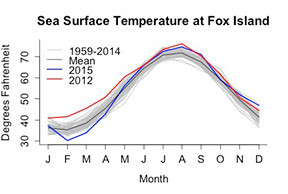 An oceanographer at the University of Rhode Island’s Graduate School of Oceanography said temperatures in Narragansett Bay hit record highs and lows in 2015. Jeremy Collie said the temperatures represent the “most extreme” fluctuations observed since the school started surveying the waters 56 years ago. The findings came from GSO’s Narragansett Bay Fish Trawl, which is done to sample fish every week in the bay and track seasonal or annual changes of marine life. Water temperature also is recorded weekly at the same site off Wickford Village in North Kingstown. Collie has managed the trawl since 1998. Read the article here 12:25
An oceanographer at the University of Rhode Island’s Graduate School of Oceanography said temperatures in Narragansett Bay hit record highs and lows in 2015. Jeremy Collie said the temperatures represent the “most extreme” fluctuations observed since the school started surveying the waters 56 years ago. The findings came from GSO’s Narragansett Bay Fish Trawl, which is done to sample fish every week in the bay and track seasonal or annual changes of marine life. Water temperature also is recorded weekly at the same site off Wickford Village in North Kingstown. Collie has managed the trawl since 1998. Read the article here 12:25
Raising The Profile Of An Undereaten Fish
Fishermen are facing tougher quotas and declining populations for some of the most popular fish species, most notably Cod, a New England favorite. That’s one reason why environmentalists and fishermen have been working to promote more locally-caught seafood. Some, like lobster, quahogs, and other shellfish are catching on. But there are other fish that teem the waters of Narragansett Bay. There’s one effort underway to raise awareness about scup, an abundant local catch. Audio, Read the rest here 06:54
“One Square Mile.” Narragansett Bay: Trawling bay becoming more dire, say fishermen, scientists
To begin the discussion, Espinoza posed a series of questions to the panelists, seeking input on what it was like fishing in the bay in previous decades. She also wanted to know how commercial fishermen are adapting in order to stay in business. Captain Denny Ingram is a commercial lobsterman from Warren who has been fishing for 35 years. He recalled his childhood in the upper bay, collecting rockweed to sell for a dollar a bag in the late 1960s. Read the rest here 19:25

































